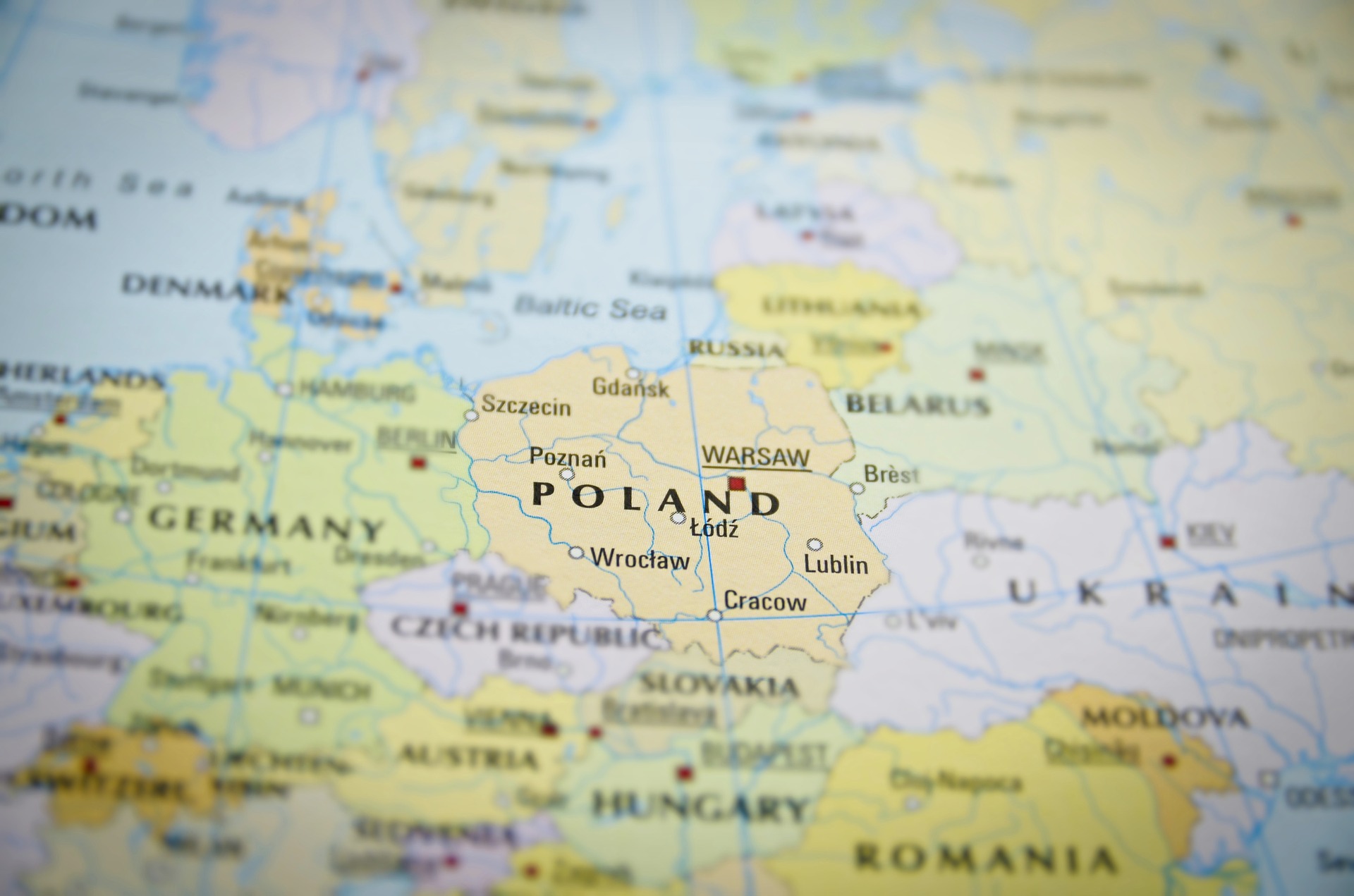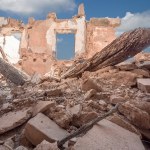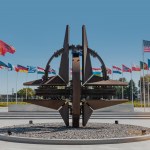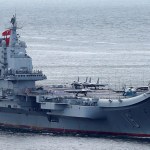
Nie masz czasu na zapoznanie się z całością artykułu?
Wystarczy, że klikniesz ikonę „oznacz artykuł do przeczytania później”. Wszystkie zapisane publikacje znajdziesz w profilu czytelnikaSyria – a war where everyone loses

Article originally published on 22.8.2019
The war in Syria is not as ubiquitous a topic as it used to be, both because the roars of guns are not as loud any more and because it has lasted for so long that journalists and politicians alike have become inured to it. The global community, which has set the tone for the wartime narrative since the very beginning, is no longer interested in following its events. The Syrian civil war was supposed to bring the Arab Spring and democracy to a country which had long been ruled by the Assad family. Instead, it resulted in half a million casualties, millions of refugees and the destabilisation of the region. It is difficult to determine the victor of the armed conflict in Syria, as the war has been lost by nearly everyone involved. And, despite the Islamic State being dismantled, the conflict is not yet over.
Loser number one – the Syrian opposition
It was the Syrian opposition that was presented as defending Syria from an evil regime. The Free Syrian Army was supposed to fight for democracy in the Middle-Eastern state, but in the end proved to be impotent in the face of the religious fanaticism which became one of the distinctive characteristics of the war. In the early stages, the West acknowledged the opposition as the representatives of a new Syria. It was the opposition that was supposed to rebuild the country in its new form. However, democracy apparently was not enough to bring all enemies of the Assad regime together. Soon after the initial waves of protests escalated into an all-out war, it became clear that the Syrian front and society were increasingly divided along ethical and religious lines. And Syrian society, despite being lumped together by the West with other “Arabs”, is not all that Arabic.
The Syrian Christians have been looking for ways to improve their lot for years. They were able to survive despite the tumultuous events of the past and in the face of Islamic domination
Initial media coverage presented the anti-Assad resistance as fighting for a just cause. There were supporters of the regime, and those who fought for democracy. This classification was too simplified – a common case of the media cutting corners. While the situation was more clear-cut in Tunisia, the religious and sectarian divides in Syria did not fit this simplified description. Since the 1970s, Syria has been ruled by the Assad family, who profess Alawism, which is an offshoot of Islam considered heretical by Sunnis. Alawites, who make up approximately 11% of the Syrian population, had for centuries lived on the fringes of Middle-Eastern society. It was not until the French arrived in Syria to take control on behalf of the League of Nations that they were able to seize the opportunity offered by the newly-forming armed forces. The military enabled the marginalised Alawites to achieve greater social mobility, and the Sunni elites saw no reason to have their sons enlist in the army. This way, the Alawite minority served its way to the top.
It was thus hatred that unified those who oppose the Assad family. On the one hand, the opposition wanted the Sunni majority, that is 74% of the Syrian population, to take over. The other unifying factor was the animosity caused by religious differences. Hatred is not enough for a successful power grab, however. What led to the breakout of this years-long conflict was the involvement of radical Islamist groups. It was them who possessed the necessary strength. The allegedly monolithic opposition also cracked along national and ethical lines. The battle was joined by the Syrian Kurds, who did not dream about living in a new Syria free from Assad, but about their own state which would unite them with their kin in Iraq and Turkey. The Kurdish movement further divided the opposition, eventually leading to an internal conflict. The idea of a unified anti-Assad resistance fell to pieces which did not fit together any more.
While initial reports alleged that various communities, including the Alawites, had joined the fight against the Assad family, radical Islamists quickly let everyone know that a good Alawite was a dead Alawite, and that there was no place for “infidels” in the opposition’s ranks. Syrian journalist Samar Yazbek, an Alawite, wrote a moving report on this topic titled The Crossing: My Journey to the Shattered Heart of Syria. Despite her being an Alawite, she was critical of Assad, forcing her to leave the country. She returned to a Syria engulfed by conflict, arriving in the rebel-occupied territories. However, she found that it was no longer enough to oppose the hated regime to be part of the resistance. It was necessary to be a Sunni, and admitting to being an Alawite was a death sentence. All Alawites were evil, regardless of if they were critical of the authorities residing in Damascus or not.
The contribution of the western media was to paint a one-sided picture of the conflict, a display of ignorance of the context which gave rise to the Syrian civil war
This hatred spelled the opposition’s doom. The beneficiaries of this defeat included the Islamic State and the Syrian Kurds, who decided to take control over the north-eastern parts of Syria. In the same year, they were able to crush the last bastion of the Islamic State in the country, causing its physical abolishment.
The Christians lost
While the Kurds could count on the support of their large community and parts of the public, Syrian Christians, who belong to different Churches, some of them dating back to early post-Christ times, received no such help. The Roman Catholic Church and those remaining in communion with the Holy See do not constitute that large a community. The history of Christianity in Syria was shaped primarily by eastern Churches. Assyrian Christians, who found shelter in Syria during the pogroms in the Ottoman Empire and Iraq, perpetrated by Kurds with Turkish permission, are a very old community. The Assyrians living in Syria, who are now very few in number, will never forget those events. They had been leaving the Syrian state for decades, resettling in various Western countries. The war, which is still going on, was the final blow. The oppression levelled at them by the Islamic State left many Assyrian settlements empty. On the other hand, the Kurdish rebels, who are now more numerous than the local Christians, have made attempts at “Kurdising” the existing education system. Kurdish textbooks have been translated into the Assyrian language and their usage has been forced in Assyrian private schools and other education institutions in Qamishli, a city on the border with Turkey.
The Syrian Christians have been looking for ways to improve their lot for years. They were able to survive despite the tumultuous events of the past and in the face of Islamic domination. Many chose to leave even before the war began. Yet still, they made their presence as followers of Christ known in Syria, even though they belonged to different Churches. The Alawites, who also constituted a minority, became their only allies against the threat of radical Islamic rebels. Those Christians who remained in the war-torn country entered into an alliance of convenience with the Assad dynasty. The greater the successes of the opposition, the stronger the unified loyalist front would become, now consisting of Alawites, Christians, as well as other minorities such as Shia Muslims.
If we assume that Assad’s survival is a victory for the Syrian regime, which weathered the storm, then yes, but it is a Pyrrhic victory at best
However, the war was what finally forced them to flee. Whoever could, left Syria and attempted to bring their families to their new homes, resulting in more Christian houses and settlements emptying out. Some Christians did not have the opportunity to flee and had to remain in a country laid waste by war. The Syria which is now emerging from the rubble of a still-ongoing war will be religiously and culturally destitute. Only scattered fragments will remain of what used to be an ethnic and religious mosaic.
Several Christian towns still exist. One of them is Sqelbiye, a place which I became well acquainted with even before the war. The settlement, located in the ancient Apamea region and founded by the Greek Seleucids, continues to serve as a symbol of Christian resistance. Sqelbiye found itself on the front line. When the rebellion was at its most successful, the revolutionaries came close to its borders, firing shots and launching attacks from Apamea. The local residents rushed to defend their homes, thus declaring their support for the government forces. As of writing this article, even though the front line has been pushed north by the loyalist counteroffensive, missiles are still launched at Sqelbiye. Six died on 13 May, including four children.
No victory for the West
The West, that is the European Union and the United States, has also suffered a terrible defeat. It lost its role as an effective mediator and the opportunity to discipline the Arab Peninsula, whose countries openly sympathised with the opposition. Its lack of a coherent policy and vehement refusal to communicate with the Syrian regime did not foster conditions for genuine negotiations. Any attempts made were chaotic and doomed to fail, their effectiveness equal to that of the Free Syrian Army. Nobody was able to determine who actually received the weapon shipments sent, and the involvement of Western troops was greatly limited. The West, especially the anti-Assad United States, erred in its assessments. The opposition failed to defeat the Syrian regime. The ultimately inept efforts of American diplomats and their allies in the Middle East and Europe served to destabilise the region even further.
It appears as though the West was also silent when the social unrest which eventually transformed into the civil was in its infancy. It is becoming increasingly common to hear people claim that the anti-Assad demonstrations were as spontaneous as the pro-regime rallies organised during peacetime. Today nobody denies the involvement of rich Arab countries in stoking the fires of conflict, which they benefited from. Bashar al-Assad, even though he had to gain the favour of the Sunnis like his father Hafez before him, was first and foremost an Alawite and a natural ally to Shiite Iran. It was Tehran that came to the rescue when the son of Hafez al-Assad was under siege on all sides.
The contribution of the western media was to paint a one-sided picture of the conflict, a display of ignorance of the context which gave rise to the Syrian civil war. The focus shifted from demonstrations to the crimes of the regime, glossing over the fact that both sides were guilty of various atrocities. Various short media reports appearing on major news programmes would have you think it was a war for democracy. Did any of the journalists working on those reports ever think about what would happen if the opposition won? What would that victory mean for various Syrian minorities?
Syria is in exile today. The Syrians have left, seeking asylum in other countries in the Middle East, Europe, the US and Australia
Syria was the grand finale of the Arab Spring, as well as a terrible disaster. It was not followed by summer, what we got instead was autumn and winter. This change of seasons was especially painful for Syria. I spoke to some of my Tunisian friends shortly after the US Embassy in Tunis burnt down. When asked about the Arab Spring and their opinions on the conflict in Syria, they immediately answered that the situation in Damascus would be much more difficult because a religious war was brewing there. And that is exactly what happened. Now the only thing left to do for the Western world is to be appalled at the crimes perpetrated in Syria. The Syrian conflict soon affected Europe as well, which had to think about what to do about another (after Libya) destabilised country, as well as its residents, who were looking for shelter outside of the Middle East.
Turkey failed as well
The government in Ankara is still openly supporting President Assad’s enemies. Turkey has its Ottoman legacy to consider, and the current president is considered a great restorer of the country’s former glory. It is thus no wonder that Syria’s northern neighbour sends rapacious glances at its territory, which used to be under Ottoman rule. Conflicts between Syria and Turkey have already happened in the past. The Syrian regime has not forgotten how the Sanjak of Alexandretta was taken from Syria and given to Turkey by France shortly before World War II, bringing Antakya, that is ancient Antioch, under Turkish control.
When the Assad dynasty came to power, Ankara did not like the support offered by the Syrian government to the Kurdistan Workers’ Party. In the 21st century, the Turkish regime extended its support for Syrian rebels in hopes of weakening Syria. At the same time, it took interest in the areas controlled by Syrian Kurds, whom they no longer wanted to help, instead launching attacks on their positions. This was caused to prevent another Kurdish rebellion in the already-unstable south-eastern territories of Turkey.
Today, rebels supported by Turkey form the last pockets of resistance located around Idlib and north of Hama. Like the West, Turkey failed to predict that Assad could survive the war, even though this would not have been possible without Russian and Iranian involvement. Also uncertain is the fate of the territories controlled by the Kurdish People’s Protection Units, which ensure their autonomy as part of a new region known as the Autonomous Administration of North and East Syria. Nobody can tell if this part of Syria, located east of the Euphrates and rich in oil fields, will return under Syrian control. If not, what will the Turks do? Will they allow it to exist? Much will depend on the United States. It was American soldiers who were sent to the Kurdish-controlled territories, helping defeat the Islamic State. Still, US President Donald Trump announced late last year that even this modest force would be withdrawn from Syria as well.
Pyrrhic victory for the Assad dynasty and Russia
Are there any winners in this war? If we assume that Assad’s survival is a victory for the Syrian regime, which weathered the storm, then yes, but it is a Pyrrhic victory at best. The casualties on both sides of the conflict will remain a deep wound which will prevent the people of Syria from coming together again. Despite the government propaganda spread by the Syrian Arab News Agency, which claims that new tourist attractions are being readied for visitors to enjoy, the country will be a far cry from normality. Too much blood has been shed during the war, too much has been destroyed. The Syria I once knew will never return.
A Pyrrhic, though strategic, victory is the successful defence, even reinforcement, of Russia’s foothold in the Middle East. It is Pyrrhic because it cost many lives, with more being lost the longer the conflict lasts. It is strategic because the Kremlin managed to keep in power an ally which has been there since the USSR. In return, Moscow can increase its military presence in the region, making Assad loyal to Russia and forcing him to toe its line. After all, Assad has Vladimir Putin to thank not only for being able to remain in power, but also for his life. Not only did the Russians defend Assad on the front lines – most importantly, they prevented the regime from falling by standing up for it in front of other countries. It was the Russian army and the support it offered that tipped the scales of this dubious victory in favour of the Alawite president.
Even in its imperial incarnation, Russia aspired to extend its influence over the Middle East. During the 19th century, during the Ottoman period, it stood as the protector of all Orthodox Christians living in the area. Also important were the Russian plans to take control of what used to be the Byzantine Empire – the Russian Orthodox Church considered itself its inheritor. The revolution prevented the plans from ever being implemented, but it is still possible for Putin to bring them back, especially considering that some Syrian Christians view him as someone who can protect them from Islamists.
A country in exile
We do not know how long it will take for the conflict to subside and the Syrian state to be whole again. We cannot even predict if this process can be completed, considering the aspirations of the Syrian Kurds. Another sudden twist may happen there, and after Assad finally defeats his enemies, who are still supported by Turkey, Ankara and Damascus may come to an agreement to prevent an independent Kurdish state being established in Syria. This will only be possible once the Kurdish autonomous areas are brought back under Syrian rule. In any case, Assad emerges from the conflict dependent on Russia, and as long as the Kremlin supports his rule, Turkey will not turn on him, and it certainly would not turn on Syria if it were in the progress of pacifying the Kurds.
Turkey stood to benefit from the unstable situation in the neighbouring country, and not only because it believed the anti-Assad rebellion had a chance to achieve victory. The resulting refugee migration proved to be a useful bargaining chip in Turkey’s negotiations with the European Union, which failed to effectively control its borders. In exchange for financial support, Europe bought the right to send refugees who arrived on one of the Greek islands back to Turkey. Turkish President Recep Erdoğan is in a comfortable position right now, his autocratic style of government legitimised.
All this does not change the fact that Syria is in exile today. The Syrians have left, seeking asylum in other countries in the Middle East, Europe, the US and Australia. Most of them will not want to return to a ruined country where uncertainty is the only thing that awaits them. A country where war is still raging. It is better to stay where you can work in peace and raise your children instead of returning to a country which does not offer many great prospects. Christians are especially vulnerable in all of this – their numbers had already been dwindling (making up only 8.9% of the Syrian population according to official statistics), and the recent exodus will only accelerate the process. In the meantime, Aleppo is once again shaken by explosions…
The translation was financed by the National Freedom Institute – Centre for Civil Society Development from the funds of The Civil Society Organisations Development Programme 2018-2030

Tłumaczenie sfinansowano przez Narodowy Instytut Wolności – Centrum Rozwoju Społeczeństwa Obywatelskiego ze środków Programu Rozwoju Organizacji Obywatelskich na lata 2018-2030

Zobacz
The China Dream reigns at sea
A study published in 2016 argued that China was going to have the second largest navy in the world, second only to the US in 2020. Now we have new estimates suggesting that China’s navy is already the largest one in the world






















